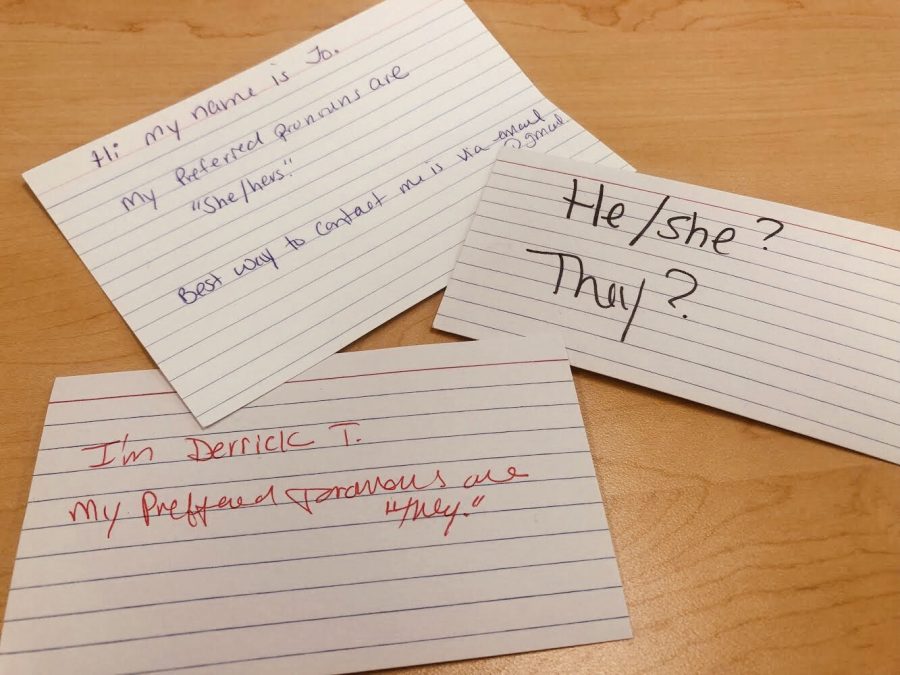What the Hawk…should I do?
What the Hawk…should I do?
I’m a trans woman and I’ve had a problem with one of my professors; she won’t call me by my preferred name and pronouns! My name hasn’t been changed legally and still shows up as my deadname (the name I was given at birth that I no longer identify with) on the class roster, so that’s what she chooses to call me despite my reminders to her. People ask their professors to call them by their nicknames all the time and there’s never a problem with that! I feel really disrespected by someone I’m supposed to look up to and learn from….what should I do?
Sincerely,
A student who has had enough
Who chirped in:
- Dean Kapolas, a trans-male student at Harper
- Jeff Przybylo, Department Chair of Speech & Theater, Communications Instructor
- Jaime Long, Dean of Liberal Arts
Dear “A student who has had enough,”
We hear you. Acceptance of who you are and how you identify is your right. This situation would stir a lot of emotions for anyone and your feelings of frustration are justified. We spoke with some folks on how best to address the situation. Not surprisingly, communication is key.
“If I were in this situation, I would communicate with higher-ups and then drop the class,” Kapolas said.
Teachers need to understand that there’s a safety issue when they don’t honor the student’s preferred pronouns. It could be detrimental to the student, especially depending on where they are in their transition and if they have a harder time “passing” as their gender identity.
“You don’t know how other students in the classroom are going to react,” Kapolas said.
When an instructor sets an example of disrespect, that opens the door for potential harassment and outing a student who may not be ready.
Student, try reaching out to your teacher and emphasizing that safety aspect to help them recognize the gravity of your situation. Let them know that their actions make you feel unsafe.
Kapolas recalled a strategy he used with teachers to prevent this issue. “I walked up to the professor on the first day and said ‘Hi I’m Dean. I know it’s going to say something else on the roster but I want you to please call me Dean.’ ”
Student, if you’ve already had “the talk” with your teacher then it might be a question of why she keeps slipping up.
As a Communications instructor, Jeff Przybylo believes that it’s important to learn to communicate in ways that are appropriate and show respect to our audience.
Przybylo believes that teachers have an obligation to use a student’s preferred name and pronouns.
“I think you should be called what you want to be called,” he said. “That’s almost like saying ‘my name is John but my teacher keeps calling me Jack.’ You have a right to be called John because that’s who you are.”
Students are always welcome to share their concerns with department chairs.
“I would listen to a student and find out if they feel like they’re being mistreated,” Przybylo explained. “Then I would probably talk to the teacher privately and help them work through it.”
We also think this is a situation where a little patience and compassion can go a long way, both ways. For your teacher, it might be a difficulty adapting her language and not an intentional means to disrespect you. It may be a good idea to come up with a plan or system that corrects her when she makes the error.
Our panelists agreed that everyone should come to the situation with patience, an open mind, and a willingness to communicate. Faculty and students need to be understanding of one another; these situations have the potential to be a teaching and learning moment for everyone.
Przybylo and Kapolas also noted that it’s a good strategy when teachers pass out note cards on the first day of class that ask for preferred pronouns and names. Doing this can help prevent confusion and help a student avoid a potentially intimidating confrontation and conversation. Even an email to the instructor before class starts can help.
“There is a big communication gap about gender here,” Przybylo added. “But once everyone understands that it’s difficult but okay to ask questions, then everyone can start to feel like they’re being treated fairly.”
Finally, we received some important information from an administrative standpoint. Dean Jamie Long provided us with a few important resources for students experiencing discriminatory treatment.
Students should reach out to the Office of the Dean of Student Affairs in Room A367, which advocates for any needs and concerns of students.
When an informal discussion with a professor fails to resolve the problem, you as a student can “submit a complaint and desired resolution in writing to the department chair.” Long recommends reaching out to Harper’s student conduct officer, Mike Vanlandingham, to help walk you through the Student Non-Academic Complaint process. You can contact him at (847) 925-6898 or [email protected]. More information about the process can be found on page 64 of the Catalog and Student Handbook.
Finally, Long mentioned some news you might find exciting.
To better support the entire campus community including our transgender and non-gender conforming students, Harper is preparing to implement chosen name procedures in which students will be able to choose a name other than their legal name to identify themselves at Harper. Chosen names will be displayed on class rosters, the MyHarper portal, Degree Works, ID cards and other places. The plan is to introduce these new chosen name procedures sometime this summer, and Harper will be sure to communicate the details extensively at that time, the dean explained.
Harper hears you too, and is working toward a safer and more inclusive environment on campus for everyone.
Student, thank you for reaching out to us with your question and trusting us to find the answers. Your courage helps your fellow students who might be too scared to speak up. Good luck!
Reader, if you have a topic you’d like us to discuss, email [email protected]











